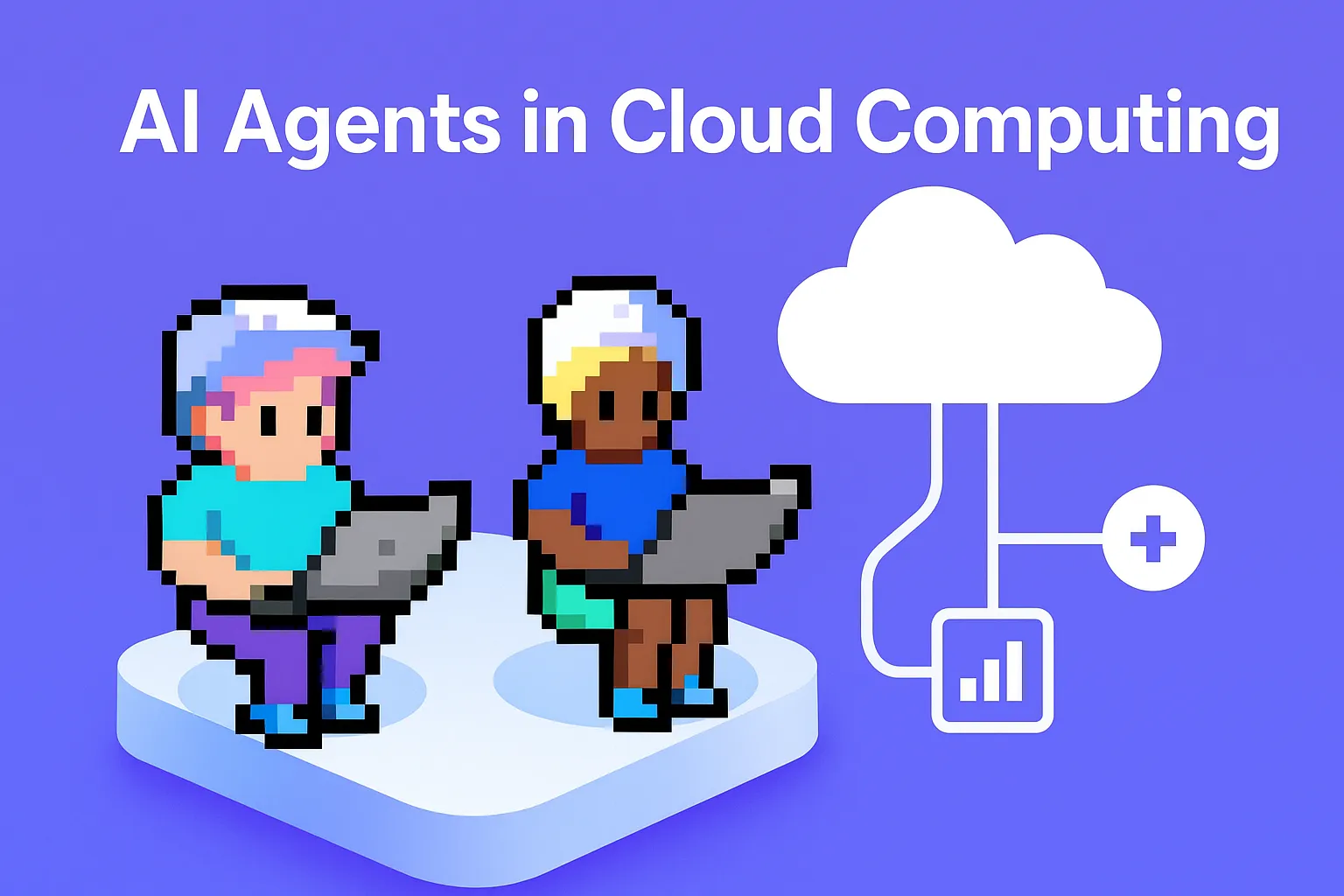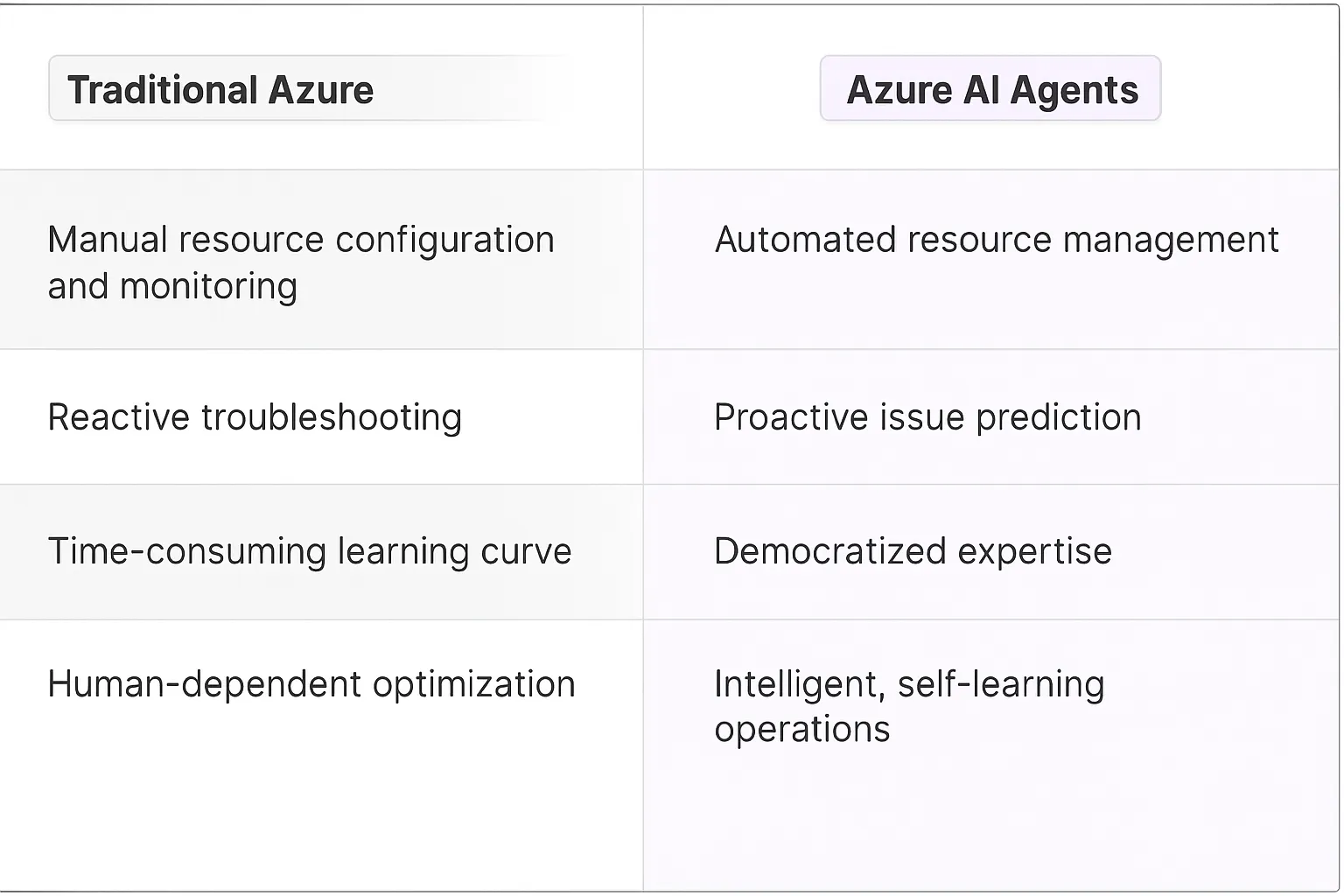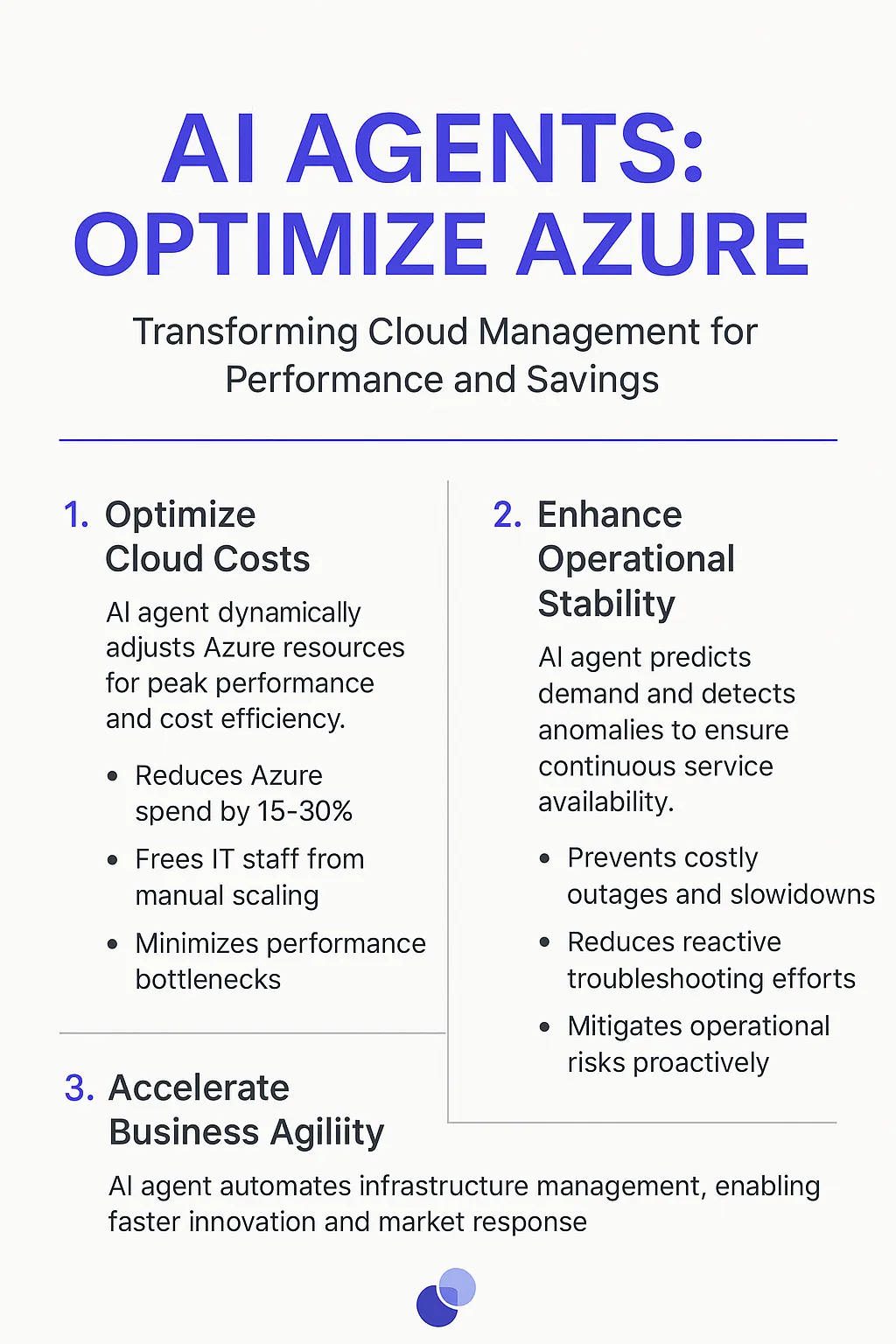Microsoft Azure AI Agents
Understanding Microsoft Azure
What is Microsoft Azure?
Microsoft Azure is a cloud computing powerhouse that's been quietly eating the world. It's not just another hosting platform; it's a full-stack Swiss Army knife for businesses looking to level up their digital game. Azure offers a smorgasbord of services, from virtual machines and databases to cutting-edge machine learning tools. It's the backbone that's powering everything from startups to Fortune 500 giants, giving them the flexibility to scale at warp speed without breaking a sweat.
Key Features of Microsoft Azure
Azure's not playing around when it comes to features. We're talking global reach with data centers spread across the planet, ensuring your apps are blazing fast no matter where your users are. It's got security baked in at every level, so you can sleep easy knowing your data's Fort Knox-level protected. The platform's hybrid capabilities are a game-changer, letting you seamlessly blend on-premises systems with cloud resources. And let's not forget the AI and machine learning tools that are so advanced, they make Skynet look like a calculator. Azure's not just keeping pace with the cloud revolution; it's setting the tempo.

Benefits of AI Agents for Microsoft Azure
What would have been used before AI Agents?
Before AI agents entered the scene, Azure users were stuck in a world of manual configurations, endless documentation scrolling, and the dreaded trial-and-error approach. It was like trying to navigate a maze blindfolded while juggling flaming torches. Developers and IT ops spent countless hours wrestling with complex setups, troubleshooting issues, and attempting to optimize their Azure environments. The learning curve was steep, and the potential for costly mistakes loomed large.
Teams relied heavily on human experts, often creating bottlenecks and slowing down projects. It was a time when "Azure guru" was both a job title and a survival necessity. The cognitive load on individuals was immense, requiring them to keep up with Azure's rapidly evolving features and best practices. This pre-AI agent era was marked by inefficiency, frustration, and missed opportunities for innovation.
What are the benefits of AI Agents?
Enter AI agents for Azure - the game-changers that are flipping the script on cloud management. These digital teammates are like having a seasoned Azure architect on speed dial 24/7, minus the coffee addiction and obscure tech jokes.
First off, AI agents dramatically cut down the learning curve. They're essentially democratizing Azure expertise, allowing newcomers to punch above their weight class almost immediately. This isn't just about saving time; it's about unleashing creativity. When you're not bogged down in configuration hell, you can focus on building cool stuff that actually moves the needle for your business.
These AI agents are also error-prevention ninjas. They catch potential misconfigurations before they turn into production nightmares, saving companies from those "why is our cloud bill suddenly the GDP of a small country?" moments. It's like having a hyper-vigilant, never-sleeping guardian for your Azure environment.
But here's where it gets really interesting: AI agents are learning machines. They're constantly evolving, absorbing new Azure updates and best practices faster than any human could. This means your Azure environment isn't just being managed; it's being future-proofed. You're always riding the cutting edge without the risk of falling off.
The real kicker? AI agents are breaking down silos in organizations. They're creating a common language between developers, IT ops, and even non-technical stakeholders. Suddenly, Azure isn't this mysterious black box. It's becoming a shared playground where ideas can flow freely, and innovation can thrive.
In essence, AI agents for Azure are not just tools; they're catalysts for a cultural shift in how we approach cloud computing. They're turning Azure from a complex platform into a malleable canvas for digital innovation. And in this era where speed and adaptability are currency, that's not just an advantage - it's the whole ballgame.

Potential Use Cases of AI Agents with Microsoft Azure
Processes
AI agents in Microsoft Azure are game-changers for enterprise-level processes. They're not just fancy chatbots; they're digital teammates that can transform how businesses operate at scale. Let's dive into some concrete examples:
- Automated Cloud Resource Management: AI agents can monitor Azure resources 24/7, adjusting compute power and storage based on real-time demand. This isn't just cost-saving; it's about maintaining peak performance without human intervention.
- Intelligent Data Pipeline Orchestration: These agents can oversee complex ETL processes, making on-the-fly decisions about data routing, transformation, and storage. They're essentially becoming the brain of your data infrastructure.
- Predictive Maintenance for IoT Devices: By analyzing telemetry data from Azure-connected IoT devices, AI agents can predict failures before they happen, scheduling maintenance only when it's truly needed. This moves us from reactive to proactive operations.
- Dynamic Security Policy Enforcement: AI agents can continuously assess security threats, automatically updating Azure AD policies and firewall rules. They're essentially evolving your security posture in real-time.
Tasks
On a more granular level, AI agents in Azure can tackle specific tasks that traditionally eat up valuable human hours:
- Code Review and Optimization: These agents can analyze code pushed to Azure DevOps, suggesting optimizations and catching potential bugs before they hit production. It's like having a senior developer looking over your shoulder 24/7.
- Natural Language Query Processing: AI agents can translate natural language questions into complex SQL queries for Azure SQL Database, democratizing data access across the organization.
- Automated Customer Support Triage: By integrating with Azure Cognitive Services, these agents can categorize and prioritize support tickets, even drafting initial responses based on historical data.
- Dynamic Content Personalization: For Azure-hosted websites, AI agents can personalize content in real-time based on user behavior, essentially turning every site into a dynamic, user-specific experience.
The key here is that these AI agents aren't just automating tasks; they're augmenting human capabilities in ways that were previously unimaginable. They're not replacing jobs; they're elevating roles, allowing humans to focus on higher-level strategy and creativity.
As we move forward, the companies that will win are those that figure out how to effectively collaborate with these AI agents, creating a symbiosis between human intuition and machine intelligence. It's not about man vs. machine; it's about man and machine vs. the problems we need to solve.

Industry Use Cases
Microsoft Azure AI agents are reshaping industries with their adaptability and intelligence. These digital teammates aren't just tools; they're game-changers that are redefining how businesses operate. Let's dive into some real-world scenarios where Azure AI agents are making waves:
In healthcare, these AI powerhouses are revolutionizing patient care. They're not just crunching numbers; they're predicting disease outbreaks, personalizing treatment plans, and even assisting in complex surgeries. It's like having a brilliant doctor's brain, multiplied by a thousand, working 24/7.
For finance, Azure AI agents are the new quants on steroids. They're spotting market trends before they emerge, flagging fraudulent transactions in milliseconds, and crafting investment strategies that would make Warren Buffett do a double-take. It's not just about faster trades; it's about smarter financial ecosystems.
In manufacturing, these AI teammates are the ultimate efficiency experts. They're optimizing supply chains, predicting equipment failures before they happen, and fine-tuning production lines to levels of precision that would make Six Sigma look like guesswork. It's manufacturing, but with a Silicon Valley IQ.
The retail sector? Azure AI agents are turning it into a personalization playground. They're creating shopping experiences so tailored, you'd think each store was built just for you. From inventory management that borders on clairvoyance to customer service that feels like mind-reading, it's retail therapy taken to new heights.
These aren't just use cases; they're glimpses into a future where AI doesn't just support industries - it propels them into new realms of possibility. Azure AI agents are the secret sauce that's turning science fiction into business reality.
Healthcare Transformation with Azure AI Agents
The healthcare industry is ripe for disruption, and Microsoft Azure AI Agents are poised to be the catalyst. Let's dive into how these digital teammates could revolutionize patient care and operational efficiency in hospitals.
Consider a bustling emergency room where every second counts. Azure AI Agents could be deployed to triage patients more effectively by analyzing symptoms, medical histories, and vital signs in real-time. These agents would work alongside human medical staff, not to replace them, but to augment their capabilities and help them make faster, more informed decisions.
For example, as a patient describes their symptoms to a nurse, an Azure AI Agent could simultaneously cross-reference this information with the patient's electronic health records, recent lab results, and the latest medical research. Within seconds, it could provide the attending physician with a prioritized list of potential diagnoses and suggested tests or treatments.
But the impact doesn't stop at the point of care. These AI agents could continuously monitor patient data across the entire hospital, identifying patterns that might indicate the onset of complications or the spread of hospital-acquired infections before they become critical. This proactive approach could significantly reduce mortality rates and improve overall patient outcomes.
On the operational side, Azure AI Agents could optimize resource allocation by predicting patient influx, managing bed assignments, and coordinating staff schedules. They could even assist in inventory management, ensuring that critical supplies and medications are always in stock without tying up excessive capital in unused inventory.
The beauty of this application lies in its scalability. As these AI agents learn and improve from each interaction and data point, their effectiveness would compound over time. Smaller hospitals could benefit from insights gleaned at larger institutions, effectively democratizing access to high-quality healthcare decision support.
This isn't just about efficiency gains or cost savings. It's about fundamentally transforming the healthcare experience for both patients and providers. With Azure AI Agents handling the heavy lifting of data analysis and routine decision-making, medical professionals can focus more on the human aspects of care – empathy, complex reasoning, and building trust with patients.
As we look to the future, the potential for Azure AI Agents in healthcare is boundless. From personalized treatment plans based on genetic profiles to AI-assisted surgical procedures, we're just scratching the surface of what's possible. The hospitals that embrace this technology early will not only improve their immediate operations but will also be well-positioned to lead the next wave of healthcare innovation.
Financial Services Disruption with Azure AI Agents
The financial services industry is on the cusp of a major shift, and Azure AI Agents are the secret weapon that could flip the entire game on its head. Let's break down how these digital teammates are set to redefine banking, investment, and risk management.
Think about the current state of personal finance. Most people are flying blind, making decisions based on gut feelings or outdated advice. Now, picture an Azure AI Agent that acts as your personal CFO. It's not just crunching numbers; it's understanding your life goals, risk tolerance, and spending habits at a deep level.
This AI could analyze your transactions in real-time, spotting patterns you never noticed. It might realize you're overpaying for subscriptions or that your morning coffee habit is seriously denting your savings goals. But instead of just wagging a digital finger, it could propose actionable solutions tailored to your lifestyle.
On the investment front, Azure AI Agents could democratize access to sophisticated trading strategies once reserved for hedge funds. They could monitor global markets 24/7, analyzing news, social media sentiment, and economic indicators to make split-second trading decisions. This isn't about replacing human judgment but augmenting it with superhuman data processing capabilities.
For banks, the impact could be even more profound. Fraud detection is an obvious use case, but let's think bigger. What if an Azure AI Agent could predict which customers are likely to default on loans before they even miss a payment? It could trigger proactive interventions, potentially saving both the bank and the customer from financial distress.
Risk management in financial institutions could undergo a complete overhaul. These AI agents could simulate millions of market scenarios in seconds, stress-testing portfolios and identifying vulnerabilities that human analysts might miss. They could even suggest dynamic hedging strategies that adapt in real-time to market conditions.
But here's where it gets really interesting: network effects. As more financial institutions adopt Azure AI Agents, the collective intelligence of these systems would grow exponentially. They could start identifying macro trends and systemic risks that no single institution could see on its own.
The regulatory implications are huge. Imagine if central banks had access to this level of real-time economic insight. Monetary policy decisions could be made with unprecedented precision and foresight.
Of course, there are challenges. Data privacy is a big one. Banks will need to figure out how to leverage the power of AI while maintaining the trust of their customers. There's also the question of algorithmic bias – ensuring these AI agents make fair decisions across all demographics.
But for financial institutions willing to take the leap, the rewards could be enormous. We're talking about a fundamental reimagining of how financial services are delivered. The banks that get this right won't just be more efficient; they'll be offering an entirely new category of service that customers didn't even know they needed.
The future of finance is AI-native, and Azure AI Agents are the building blocks of this new world. The question isn't whether this transformation will happen, but who will lead it. The race is on, and the winners will reshape the financial landscape for decades to come.
Considerations and Challenges for Microsoft Azure AI Agents
Implementing Microsoft Azure AI Agents isn't a walk in the park. It's more like navigating a complex maze while juggling flaming torches. Let's dive into the nitty-gritty of what you're up against.
Technical Challenges
First off, you're dealing with a steep learning curve. Azure's AI ecosystem is vast and ever-evolving. You'll need to get cozy with Azure Cognitive Services, Azure Machine Learning, and potentially Azure Bot Service. It's not just about understanding these tools individually, but how they interplay to create a cohesive AI agent.
Data integration is another beast. Your AI agent is only as good as the data it's fed. Connecting to various data sources, ensuring data quality, and maintaining real-time synchronization can be a Herculean task. You might find yourself knee-deep in ETL processes and data pipelines before you even get to the fun AI stuff.
Then there's the challenge of scalability. Sure, Azure offers robust scaling options, but architecting your AI agent to efficiently utilize these resources is a different ball game. You'll need to think about load balancing, distributed computing, and optimizing your AI models for performance at scale.
Operational Challenges
On the operational front, cost management can be a tricky tightrope walk. Azure's pricing model is complex, and AI services can rack up costs quickly if not managed properly. You'll need to become a pro at resource allocation and utilization monitoring to keep your CFO happy.
Governance and compliance are other thorny issues. With AI agents potentially handling sensitive data, you'll need to navigate the murky waters of data privacy regulations like GDPR or CCPA. Implementing proper access controls, audit trails, and data handling procedures isn't just good practice – it's often legally required.
Lastly, there's the human factor. Integrating AI agents into existing workflows can face resistance from employees who fear job displacement. You'll need a solid change management strategy to ensure smooth adoption and utilization of your AI agents.
Remember, implementing Azure AI Agents is a marathon, not a sprint. It requires careful planning, continuous learning, and a willingness to adapt as the technology evolves. But get it right, and you'll have a powerful digital teammate that can transform your operations.
Embracing the Azure AI Revolution: A New Era of Cloud Computing
Azure AI Agents are more than just a technological advancement; they're a paradigm shift in how we approach cloud computing and business operations. These digital teammates are breaking down barriers, democratizing access to advanced AI capabilities, and enabling innovations that were once the stuff of science fiction. As we've seen, from healthcare to finance, their impact is profound and far-reaching.
But this is just the beginning. The true power of Azure AI Agents lies in their ability to learn, adapt, and evolve. As they become more sophisticated, we're likely to see entirely new business models and industries emerge. The companies that embrace this technology early and effectively will have a significant competitive edge.
However, it's crucial to approach this transformation thoughtfully. The challenges – technical, operational, and ethical – are real and shouldn't be underestimated. Success with Azure AI Agents requires not just technological prowess, but also a willingness to rethink processes, upskill teams, and navigate complex regulatory landscapes.
Ultimately, the future belongs to those who can strike the right balance between human ingenuity and AI capabilities. Azure AI Agents aren't here to replace us, but to augment us, freeing up our time and brainpower to focus on what humans do best: innovate, create, and solve complex problems. As we move forward, the question isn't whether to adopt this technology, but how to do it in a way that maximizes its potential while addressing its challenges head-on.
The Azure AI revolution is here. Are you ready to ride the wave?













